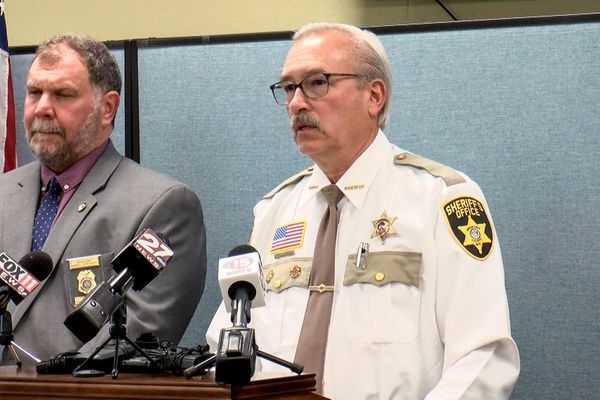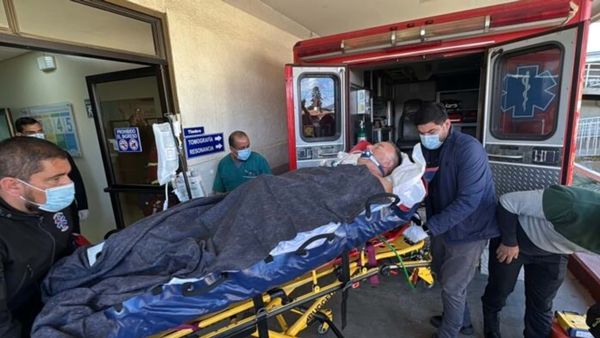
With a population of just 60,000, the Polish border city of Przemyśl has welcomed millions of Ukrainian refugees since Russia’s war of aggression started more than two years ago. For the close to 5 million Ukrainian refugees who passed through this city — which due to the war was transformed almost overnight into a humanitarian aid hub — Przemyśl has become a vital stop on their journey.
“We live only 12 kilometres from the border with Ukraine. All refugees that have come from Ukraine by train since the start of the war must come through Przemyśl,” says Jacek Paniw, a representative of Przemyśl’s city hall who was responsible for the reception of Ukrainian refugees.
People fleeing the war zone would arrive in Przemyśl at its main train station. About 10 packed trains, each carrying between 3,000 to 5,000 people, entered Przemyśl from Ukraine every day in the initial weeks of the outbreak of the full-scale war. The normal capacity of these trains is around 1,000 people.
All municipal workers, from the president down, worked at the station helping refugees access forward transportation, food, a place to stay and medical support. The mayor opened up all schools in the city and turned their gyms into a place to sleep. “A lot of citizens organised space in their homes for refugees, with many citizens working here in Przemyśl as volunteers,” Paniw adds.
Now, more than two years into Russia’s war, Przemyśl remains a lifeline for the more than 2,000 refugees that come from Ukraine every day. While the number of refugees is down significantly from 2022, the intense fighting and bombardment in frontline Ukrainian cities, including Sumy and Pokrovsk, is driving many Ukrainians out of the country.
Some refugees decide to leave permanently while others seek refuge away from bombing campaigns over the border in Przemyśl.
“A lot of time after rocket attacks in frontline parts of Ukraine, refugees come to Przemyśl and stay for the attack and then go back home,” Paniw says.
Civic action
A politically conservative city, Przemyśl’s Polish and Ukrainian populations have a deeply complicated history. From the Polish–Ukrainian War in 1918 to the population exchange between Poland and Soviet Ukraine in 1944, the connection between these two communities has been extremely strained and violent for a great deal of modern history.
“There were some nationalists who tried to play this card,” says Andrzej Orzechowski, co-founder of Wolne Miasto Przemyśl (Free City of Przemyśl), an association that supports civil and human rights in the city.
”Some people who still had objections against Ukraine as a nation were loud and we probably started to believe they were a meaningful minority, but it’s a very small group. Maybe we overestimated this,” he adds.

For Orzechowski, it was a good sign and a surprise that, despite the history of Polish-Ukrainian relations, all people in Przemyśl immediately came together to do all they could for the refugees from Ukraine.
“It was totally not organised — it was spontaneous. It was great to see because we saw a culture of trust where everyone wants to help,” he says. In the early days of the war, the cultural hub of the Ukrainian House was key in organising refugee support.
Przemyśl remains, in Orzechowski’s view, a very religious and conservative city. However, this crisis has shown how negative attitudes towards Ukrainians or refugees are disregarded when vulnerable people need urgent help.
Mutual benefit
As soon as Anna Kowalik heard that Ukrainian House was looking for volunteers, she knew she had to do something. “I couldn’t manage the situation when I watch TV news and saw the information that Russian troops invaded this area of Ukraine and many people escaped from the country,” explains Kowalik, who lives in the village of Kunkowce, a few minutes drive from Przemyśl.

Her first task was to go to the railway station, working in four-hour shifts, and hand out packs of aid to arriving Ukrainian refugees. Kowalik quickly found herself translating for refugees who needed support working out their next steps, alongside her mother who accompanied her for moral support. After around a month of volunteering, Ukrainian House offered Kowalik a job, where she worked for two years.
With a self-described nervous nature, this was a completely new experience for Kowalik, who had previously lived her life mostly in a small village.
“I didn’t have many social relations with people, so it was a shock to meet thousands of people who need help,” she adds. Before her work with Ukrainian refugees, Kowalik had experienced depression for years, and found this a challenging but essential step forward.
“I wanted to get up in the morning, not just sleep until the afternoon,” she concludes. “It was kind of my opening up to society.”







